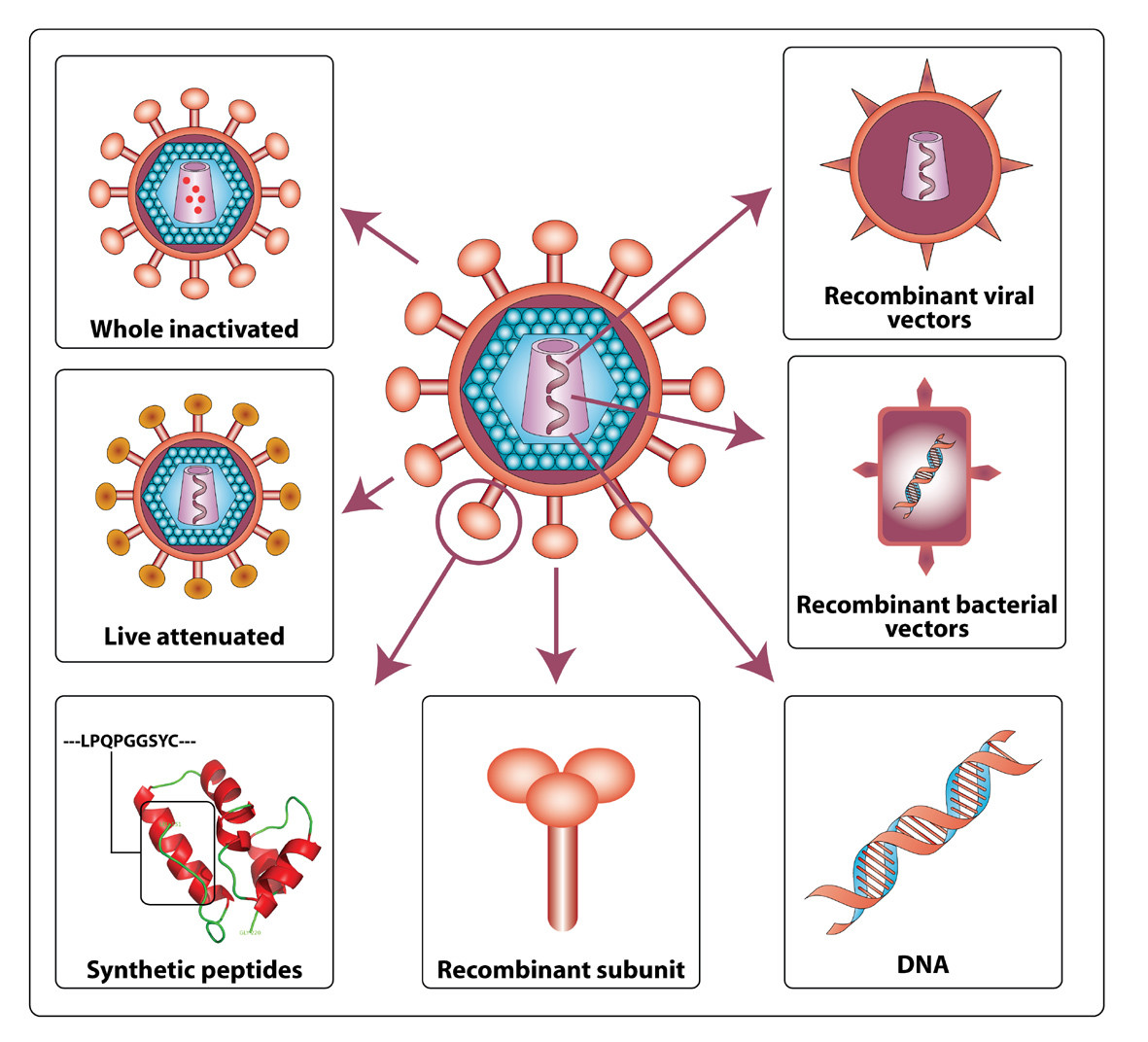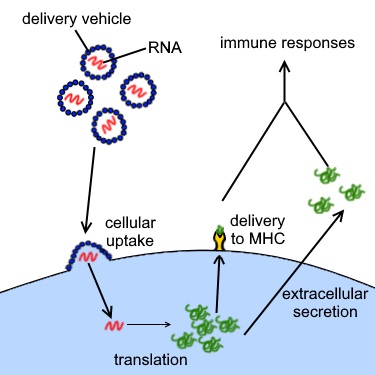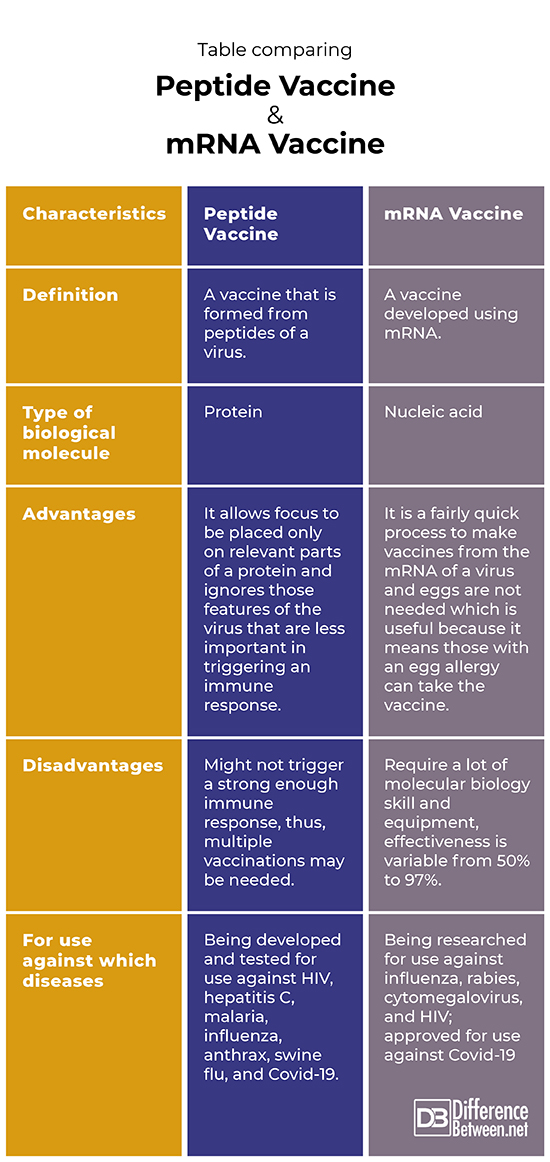Difference Between Peptide Vaccine and mRNA Vaccine
A peptide vaccine is a synthetic vaccine based on peptides from a virus. An mRNA vaccine is a vaccine generated from the messenger RNA molecule previously extracted from a virus.

What is Peptide vaccine?
Definition:
Peptide vaccines are based on sequences of amino acids that are artificially made so as to mimic the natural sequences found in a particular pathogenic organism, such as a virus.
Production of the vaccine:
First a good target protein or epitope needs to be found for the pathogen of interest. An epitope is one specific region of a protein molecule. The synthesis in the laboratory is then done using a solid phase peptide synthesis (SPPS) method. This method involves adding amino acids together to form peptide chains, which is done using resin beads that contain the needed reactive groups. Various chemical reactions are triggered using these beads, until the peptide of interest is successfully made.
How it works:
The peptide in the vaccine activates an immune system response as if you have been exposed to the actual virus. Epitopes to which antigens most readily respond should be chosen to make the vaccine because this is what antibodies , B lymphocytes, and T lymphocytes will respond to. The antibodies that are formed will attach to these epitopes if a person is infected.
Advantages:
A vaccine based on peptides has some advantages, for instance, it allows focus to be placed only on relevant parts of a protein. It has potential for use against Covid-19 since researchers have found that certain components of the coronavirus, Covid-19, namely the nucleocapsid phosphoprotein and a particular spike glycoprotein, are potentially useful in provoking an immune response, and thus could be used as part of a peptide Covid-19 vaccine.
Disadvantages:
Peptide vaccines may not trigger a strong enough immune response in people; this means that it may take multiple vaccinations, which can become expensive and also tiresome for people.
For use against which diseases:
Peptide vaccines are being created for the following illnesses: HIV, hepatitis C, malaria, influenza, anthrax, and swine flu. Scientists are also developing a peptide vaccine to fight Covid-19. Many peptide vaccines are in clinical trials and testing for effectiveness.

What is mRNA vaccine?
Definition:
An mRNA vaccine is made from messenger RNA, the transcript of a virus with the idea that this vaccine will help a person’s immune system fight off a particular virus.
Production of the vaccine:
Messenger RNA vaccines are formed using molecular biology methods in which mRNA is taken from a virus and then purified. It is then often coated with lipid particles using nanotechnology so as to provide protection to the delicate nucleic acid. Many of the current Covid-19 vaccines being produced and approved, are mRNA vaccines.
How it works:
The mRNA codes for a viral protein known as an antigen since it triggers an immune response. Once a person has been vaccinated with this type of vaccine, their immune system produces antibodies that match the antigen so as to create an immune system memory of the illness to help if the person is later exposed to the virus.
Advantages:
It is a fairly quick process to make vaccines from the mRNA nucleic acid and eggs are not neede; this is helpful because it means people with an egg allergy can take the vaccine. The mRNA vaccines have been approved in most countries for use against Covid-19.
Disadvantages:
It takes knowledge of nanotechnology and a lot of skill to make mRNA vaccines. There also seems to be a great deal of variation in how effective these vaccines are, certainly the case for Covid-19, where some vaccines appear to be only about 50% effective, while in other cases protection is thought to be as high as 97%.
For use against which diseases:
Both Pfizer/BioNTech and Moderna vaccines are currently being used in vaccination campaigns against Covid-19. Research is also being done on mRNA vaccines for use against influenza, rabies, cytomegalovirus, and HIV.
Difference between Peptide vaccine and mRNA vaccine?
Definition
A peptide vaccine is a vaccine that is formed from peptides of a virus. An mRNA vaccine is developed using messenger RNA of a virus.
Type of biological material
The type of biological material in a peptide vaccine is a protein. The type of biological material in an mRNA vaccine is a nucleic acid.
Advantages
An advantage of peptide vaccines is that it focuses on relevant parts of a protein and ignores those features that are less important in triggering an immune response. An advantage of an mRNA vaccine is that it is quick to produce the vaccine and it does not require eggs, which is helpful since many people are allergic to eggs.
Disadvantages
A disadvantage of a peptide vaccine is that it might not trigger a strong enough immune response meaning that multiple vaccinations may be needed. A disadvantage of an mRNA vaccine is that it requires a lot of molecular biology equipment and skill, and the effectiveness of the vaccines is variable.
For use against which diseases
Peptide vaccines are being developed and tested against Covid-19, HIV, hepatitis C, malaria, influenza, anthrax, and swine flu. Certain mRNA vaccines are approved for use against Covid-19; others are being tested for use against HIV, cytomegalovirus, rabies, and influenza.
Table comparing Peptide vaccine and mRNA vaccine

Summary of Peptide vaccine Vs. mRNA vaccine
- Peptide vaccines are based on amino acids while mRNA vaccines are based on nucleic acid.
- The mRNA vaccines for Covid-19 have been approved.
- Peptide vaccines for Covid-19 are being researched but none have been approved for use.
- Difference Between Rumination and Regurgitation - June 13, 2024
- Difference Between Pyelectasis and Hydronephrosis - June 4, 2024
- Difference Between Cellulitis and Erysipelas - June 1, 2024
Search DifferenceBetween.net :
Leave a Response
References :
[0]Fuller, Deborah H., and Peter Berglund. "Amplifying RNA vaccine development." New England Journal of Medicine 382.25 (2020): 2469-2471.
[1]Malonis, Ryan J., Jonathan R. Lai, and Olivia Vergnolle. "Peptide-based vaccines: current progress and future challenges." Chemical reviews 120.6 (2019): 3210-3229.
[2]Singh, Abhishek, et al. "Designing a multi-epitope peptide based vaccine against SARS-CoV-2." Scientific reports 10.1 (2020): 1-12.
[3]Image credit: https://commons.wikimedia.org/wiki/File:RNA_vaccine_illustration_(en).jpg
[4]Image credit: https://commons.wikimedia.org/wiki/File:Various_approaches_for_HIV_vaccine_development.jpg
